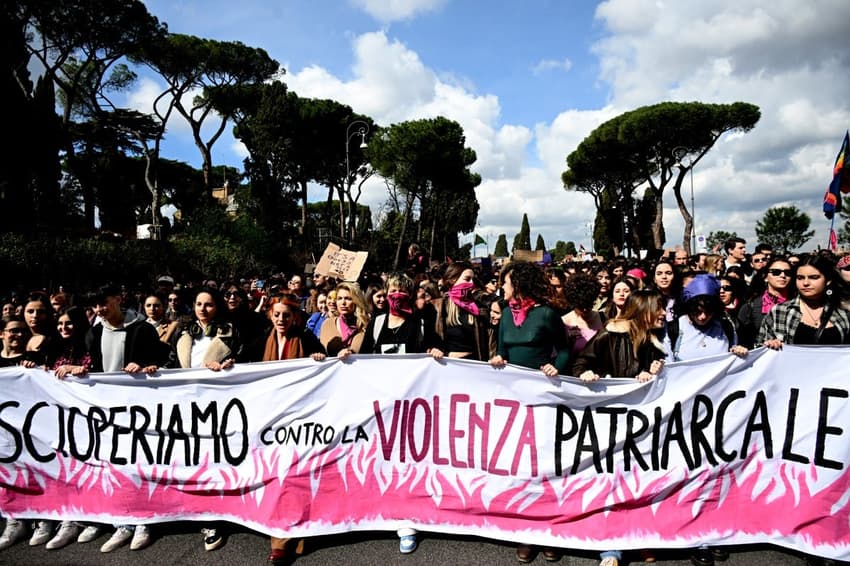What are the positives and negatives of living in Italy as a woman?

As the world marks International Women’s Day, here are some of the ups and downs of living in Italy as a woman. Share your own experiences in the comments section below.
Being a woman and living in Italy is often a mixed bag of pros and cons. On the one hand, the country is known for a number of trailblazing women, including Elena Lucrezia Corner Piscopia, the first woman ever to graduate from a university, and Maria Montessori, whose educational methods are well-known worldwide.
More recently, Italian astronaut Samantha Cristoforetti became the first female European commander of the International Space Station during her mission, Expedition 68.
Whilst all these accomplishments are huge wins for women, and particularly for Italy, they should be viewed as an exception rather than the norm.

Italian astronaut Samantha Cristoforetti. (Photo by Ludovic MARIN / POOL / AFP)
In a report published last year by the European Institute of Gender Equality, Italy’s Gender Equality Index came in at 68.2 percent which is two percent lower than the current European Union average.
The criteria which the result was based on included factors such as work, money and health
Overall, Italy ranked poorly compared to countries such as Denmark, Ireland, Germany and Spain (all of which are above the current EU equality average), but highly compared to countries such as Romania and Hungary, which did not even reach 60 percent.
To put gender equality into numerical perspective even more, last year’s edition of the Women and Peace Security Index ranked Italy 27th out of the 41 countries surveyed in Europe. Whilst this figure is not glaringly positive or negative, it is above the halfway mark of 20.
All aforementioned figures aside, it must also be noted that Italy is a sizeable country with a population of almost 60 million and 20 regions.
But what about at a local level? Are there parts of Italy where it's better to be a woman?
In a recent classification done by Il Sole 24 ore the city of Udine ranked as the best place in Italy for women with Naples coming in last.
But that’s enough with the numbers; what were the contributing societal factors that led to these results in the first place? Let’s break them down one by one, starting with upsides in Italy for women.
Advantages for women in Italy

Women don't usually change their surnames in Italy. (Photo by Alberto PIZZOLI / AFP)
If you get married, you are not expected to change your surname
Contrary to popular expectations (particularly in the United Kingdom and the United States) Italian women are not expected to change their maiden name to their spouse’s name when they marry. This is nothing new; females have been keeping their maiden names for centuries, as per the Italian norm.
Women are free to choose whether they want their spouse’s surname to be added to their maiden name under the Article 143 of the Italian Civil Code, which states: “The wife shall add her husband's surname to her own and retain it during her widowhood, until she remarries."
In general, the woman’s maiden name is kept.
READ MORE: Why does Italy have such a high female unemployment rate?
Respect for the mother figure
This obviously differs from family to family and no sweeping generalisation can be easily made here, but there tends to be a deep-rooted respect and emphasis on the mother figure in Italy and its households. The particular reason for this is unknown, but they play a crucial role in younger generations, despite the country's waning population.
It’s not uncommon for Italians to live with their mothers (for various reasons) until later on in life, which could be a good or bad thing.
There is help out there for unemployed mothers
The bonus mamme disoccupate is specifically aimed at women who find themselves unemployed during pregnancy and at the time of birth and those who find themselves unemployed during fostering or adopting a child. The amount these mothers receive depends on their indicator of equivalent economic situation (ISEE). The monthly allowance (which is paid for five months) was €383.46 in 2023 for those who had an ISEE under €19,185.13. Whilst this may help out if you are with a partner, it might not be enough if you are living alone.
At present, the same bonus is not available for new fathers.
Women have more university qualifications
The number of current female graduates not only exceeds the number of male graduates in Italy (there are 140 women for every 100 men at present): it also exceeds the European average which currently stands at 119. This is no small feat.
With the upsides come the flipsides. Here are some disadvantages of living in Italy as a woman.
Disadvantages for women in Italy

People attend the funeral of Giulia Cecchettin. (Photo by ANDREA PATTARO / AFP)
Violence against women
This is currently dominating headlines in national and regional news and for good reason too. 120 women were murdered in Italy last year, with more than half of them being killed by their partners, past or present.
Perhaps the most high-profile femicide case of last year was the murder of 23-year-old former student Giulia Cecchettin, who was set to graduate five days after she was stabbed to death by her on-off boyfriend. Her murder sparked outrage in the country with protests against female violence happening up and down. Whilst the outrage is a positive, the cause of it is a huge negative.
READ MORE: Why ending violence against women will be a tough ask in Italy
Reported sexual assault cases also increased by 40 percent between 2013 to 2022, but fortunately decreased by 13 percent in 2023.
Gender pay gap
This is a huge problem in most parts of the world and Italy is no different. In the Gender Equality Index, 31 percent of Italian women compared to 51 percent of Italian men made up for the full-time employment rate. This is nine percent lower than the European average.
In the World Economic Forum’s 2023 Global Gender Gap report, Italy ranked a dismal 79th out of 146 countries.
This is in spite of Italy having more female graduates than male.
Single women and lesbian couples cannot undergo medically assisted procreation
Under Law 40, which was implemented in 2004, single women and lesbian couples cannot undergo medical treatments for procreation such as in vitro fertilisation (IVF). It was legal in the country prior to this year.
At present, Italian residents and citizens who seek this kind of treatment, can only do so abroad.
All in all, there are some really great advantages for women living in Italy, but the majority of them seem to be centred around family or marriage rather than the woman herself. This of course leads to the numerous disadvantages, such as gender violence and unequal pay, that women face in Italy at present.
Do you have any thoughts on living in Italy as a woman? Let us know in the comments below.
Comments (1)
See Also
Being a woman and living in Italy is often a mixed bag of pros and cons. On the one hand, the country is known for a number of trailblazing women, including Elena Lucrezia Corner Piscopia, the first woman ever to graduate from a university, and Maria Montessori, whose educational methods are well-known worldwide.
More recently, Italian astronaut Samantha Cristoforetti became the first female European commander of the International Space Station during her mission, Expedition 68.
Whilst all these accomplishments are huge wins for women, and particularly for Italy, they should be viewed as an exception rather than the norm.

In a report published last year by the European Institute of Gender Equality, Italy’s Gender Equality Index came in at 68.2 percent which is two percent lower than the current European Union average.
The criteria which the result was based on included factors such as work, money and health
Overall, Italy ranked poorly compared to countries such as Denmark, Ireland, Germany and Spain (all of which are above the current EU equality average), but highly compared to countries such as Romania and Hungary, which did not even reach 60 percent.
To put gender equality into numerical perspective even more, last year’s edition of the Women and Peace Security Index ranked Italy 27th out of the 41 countries surveyed in Europe. Whilst this figure is not glaringly positive or negative, it is above the halfway mark of 20.
All aforementioned figures aside, it must also be noted that Italy is a sizeable country with a population of almost 60 million and 20 regions.
But what about at a local level? Are there parts of Italy where it's better to be a woman?
In a recent classification done by Il Sole 24 ore the city of Udine ranked as the best place in Italy for women with Naples coming in last.
But that’s enough with the numbers; what were the contributing societal factors that led to these results in the first place? Let’s break them down one by one, starting with upsides in Italy for women.
Advantages for women in Italy

If you get married, you are not expected to change your surname
Contrary to popular expectations (particularly in the United Kingdom and the United States) Italian women are not expected to change their maiden name to their spouse’s name when they marry. This is nothing new; females have been keeping their maiden names for centuries, as per the Italian norm.
Women are free to choose whether they want their spouse’s surname to be added to their maiden name under the Article 143 of the Italian Civil Code, which states: “The wife shall add her husband's surname to her own and retain it during her widowhood, until she remarries."
In general, the woman’s maiden name is kept.
READ MORE: Why does Italy have such a high female unemployment rate?
Respect for the mother figure
This obviously differs from family to family and no sweeping generalisation can be easily made here, but there tends to be a deep-rooted respect and emphasis on the mother figure in Italy and its households. The particular reason for this is unknown, but they play a crucial role in younger generations, despite the country's waning population.
It’s not uncommon for Italians to live with their mothers (for various reasons) until later on in life, which could be a good or bad thing.
There is help out there for unemployed mothers
The bonus mamme disoccupate is specifically aimed at women who find themselves unemployed during pregnancy and at the time of birth and those who find themselves unemployed during fostering or adopting a child. The amount these mothers receive depends on their indicator of equivalent economic situation (ISEE). The monthly allowance (which is paid for five months) was €383.46 in 2023 for those who had an ISEE under €19,185.13. Whilst this may help out if you are with a partner, it might not be enough if you are living alone.
At present, the same bonus is not available for new fathers.
Women have more university qualifications
The number of current female graduates not only exceeds the number of male graduates in Italy (there are 140 women for every 100 men at present): it also exceeds the European average which currently stands at 119. This is no small feat.
With the upsides come the flipsides. Here are some disadvantages of living in Italy as a woman.
Disadvantages for women in Italy

Violence against women
This is currently dominating headlines in national and regional news and for good reason too. 120 women were murdered in Italy last year, with more than half of them being killed by their partners, past or present.
Perhaps the most high-profile femicide case of last year was the murder of 23-year-old former student Giulia Cecchettin, who was set to graduate five days after she was stabbed to death by her on-off boyfriend. Her murder sparked outrage in the country with protests against female violence happening up and down. Whilst the outrage is a positive, the cause of it is a huge negative.
READ MORE: Why ending violence against women will be a tough ask in Italy
Reported sexual assault cases also increased by 40 percent between 2013 to 2022, but fortunately decreased by 13 percent in 2023.
Gender pay gap
This is a huge problem in most parts of the world and Italy is no different. In the Gender Equality Index, 31 percent of Italian women compared to 51 percent of Italian men made up for the full-time employment rate. This is nine percent lower than the European average.
In the World Economic Forum’s 2023 Global Gender Gap report, Italy ranked a dismal 79th out of 146 countries.
This is in spite of Italy having more female graduates than male.
Single women and lesbian couples cannot undergo medically assisted procreation
Under Law 40, which was implemented in 2004, single women and lesbian couples cannot undergo medical treatments for procreation such as in vitro fertilisation (IVF). It was legal in the country prior to this year.
At present, Italian residents and citizens who seek this kind of treatment, can only do so abroad.
All in all, there are some really great advantages for women living in Italy, but the majority of them seem to be centred around family or marriage rather than the woman herself. This of course leads to the numerous disadvantages, such as gender violence and unequal pay, that women face in Italy at present.
Do you have any thoughts on living in Italy as a woman? Let us know in the comments below.
Join the conversation in our comments section below. Share your own views and experience and if you have a question or suggestion for our journalists then email us at [email protected].
Please keep comments civil, constructive and on topic – and make sure to read our terms of use before getting involved.
Please log in here to leave a comment.